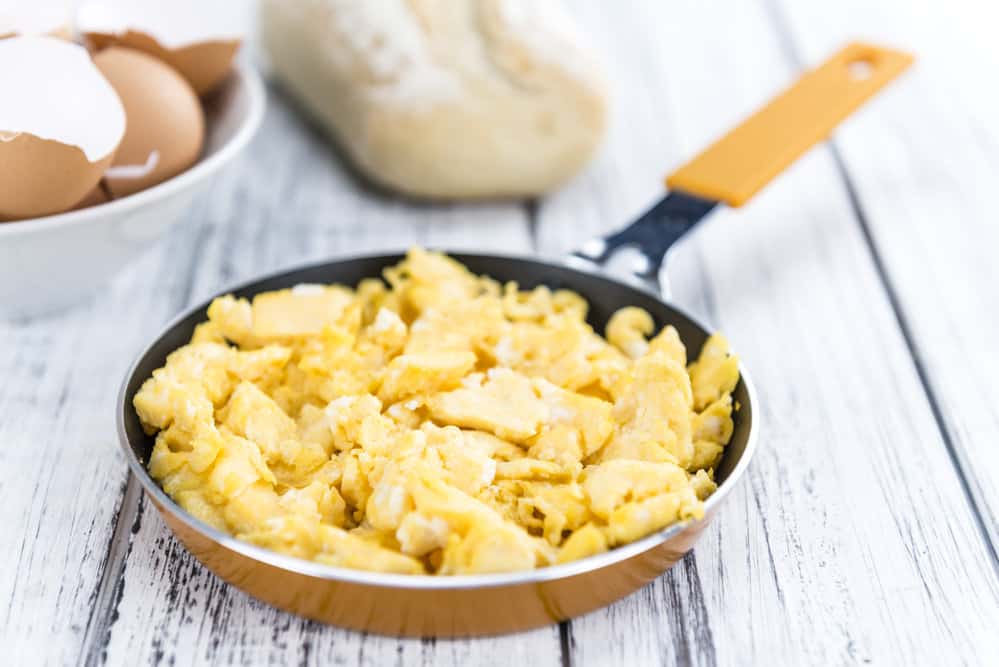The short answer is that your puppy can eat scrambled eggs as long as they're not seasoned and have no fat content such as oil and butter.
If you're considering adding eggs to your pup's diet or giving him some of your leftovers, you might be wondering, “Can puppies eat scrambled eggs?”
If so, how many eggs can they eat per day?

Is It Safe for Puppies to Eat Scrambled Eggs?
It all depends on how they were prepared. It's fine to make scrambled eggs for your little buddy, but avoid putting any additives.
Things like fats, spices, and occasionally dairy can put your puppy’s health at risk.
For example, too much salt can cause salt poisoning, and too much fat can cause pancreatic inflammation.
That's why giving in to puppy eyes and giving your doggo your leftover scrambled eggs might not be a good idea.
Aside from that, a plain scrambled egg can be a very healthy snack for your puppy.
Helpful Dog Training Resource:
For help with training your dog, you should take a look at The Online Dog Trainer by Doggy Dan. Doggy Dan is an expert Dog Trainer based in New Zealand. His online resource contains Hundreds of Excellent Dog Training Videos that will take you step-by-step through the process of developing a healthy, happy well-behaved dog.
How Do Eggs Benefit Puppies?
Eggs are high in vitamins, amino acids, minerals, and fatty acids, all of which can help your puppy grow healthy.
What's more, each part of the egg contains a different concentration of each nutrient. This makes the entire egg, including the eggshells, a highly nutritious treat.
Now, let's look at how each part of the egg functions to benefit your pup:
- Eggshells
Most of us are aware that eggshells are high in calcium. Calcium, by definition, promotes stronger bone development and healthier teeth.
What's often overlooked is that eggshells contain high concentrations of essential minerals and nutrients.
They improve the canine's metabolism and aid in the development of his immune system. Among them are:
- Zinc
- Phosphorus
- Iron
- Magnesium
- Potassium
- Iodine
- Egg Whites
A doggo's body requires 22 amino acids to produce necessary proteins, half of which it can produce on its own. The other half is supplied to your canine's body through his daily diet.
Consequently, adding egg whites helps in protein formation since they contain essential amino acids such as:
- Histidine
- Arginine
- Lysine
- Isoleucine
When your puppy's protein-making process is up and running, it'll benefit him in a variety of ways, including:
- Muscle development
- Repairing body tissues
- Hair growth
- Boosting the immune system
- Generation of new skin cells
- Egg Yolks
Egg yolk is a fatty acid powerhouse that'll primarily help your pal maintain healthy skin and cell growth. It also contains several key vitamins, including:
- Vitamin D, A, E, and K
- Vitamin B1, B6, and B12
- Folic acid
- Riboflavin
What Should I Do Before Feeding My Puppy Eggs?
To reap the benefits of an egg while avoiding complications, you should discuss three safety precautions with your veterinarian:
- Examine for Egg Allergy
To begin, you have to check whether your puppy is allergic to eggs. Surprisingly, the most common food allergens in dogs are proteins, which eggs are high in.
Food allergies can cause the following symptoms:
- Vomiting
- Diarrhea
- Itchy skin
- Digestive problems
Usually, food allergies are diagnosed through either elimination diet trials or blood tests.
- Monitor Daily Protein Intake
Go over your doggo's daily menu with your veterinarian before adding eggs to it.
Your puppy's daily protein intake may be adequate and doesn't require any additional protein. If you give him more protein than he needs, his body will excrete the excess in his urine.
However, if you increase it to very high levels, your canine will start storing excess protein as fat and may become obese.
Especially if you have a large breed puppy, such as a labrador retriever, where high protein intake can cause rapid weight gain.

- Assess Calcium Levels
That's mostly before you give your pup eggshells. If your dog's diet contains enough calcium, avoid feeding him eggshells.
High calcium levels in your puppy's bloodstream can become toxic. It can also cause kidney failure and harm to his nervous and cardiovascular systems.
How Can You Safely Feed Your Puppy Eggs?
There are a few guidelines to follow when feeding your little buddy eggs. I've divided them into dos and don'ts:
Dos:
- Cook the Egg
You should always feed your puppy cooked eggs. It makes no difference how you cook them; they just should never be raw.
So, whether scrambled or boiled, your puppy will come running to devour this treat after smelling it from afar.
- Powder the Egg Shells
If you want to feed your canine egg shells, make sure to grind them first. Egg shells can have sharp edges that can pierce the mouth or throat.
I grind them into powder with a mortar and pestle then sprinkle it on his meal. I've also seen people use a blender and a coffee grinder for this task, so do whatever works best for you.
Don'ts:
- Feed Raw Eggs
Feeding your doggo raw eggs may endanger his health. Raw eggs contain bacteria such as Salmonella and E.coli.
Besides, raw eggs can lead to biotin deficiency. Because they contain a protein called avidin, which binds to biotin, the dog's body can no longer use it.
- Cook With Fat

Cook your dog's eggs without using any oil or butter. Including fatty foods in his diet can cause pancreatitis, an inflammation of the pancreas.
Specific breeds, such as miniature schnauzers, are more likely to contract this disease.
- Add Seasoning
It's best to steer clear of salt, pepper, and other spices. Frankly, there's no harm in lightly seasoning their food; just keep in mind that too much of anything is bad.
For example, too much salt can cause salt poisoning, and too much pepper can upset the dog’s stomach.
- Include Dairy
Dairy products are a major cause of food intolerance in dogs. If you're still unsure whether your pup is lactose intolerant, avoid adding dairy to his food.
If you're certain he isn't, feel free to add small amounts of milk or cheese to his scrambled eggs.
Helpful Dog Health Resource:
Note: Our Health is #1 Priority. It should be no different for your dog. But you need to help him. The Ultimate Guide to Dog Health is the answer. This handy guide will help you recognize the symptoms of the health problems above. Get the knowledge to stay ahead of these terrible issues that can rob your lovely dog from vigor and life. Help your friend make it to 14 yrs+ without pain and suffering.
How Often Should I Feed My Puppy Eggs?
Your puppy should only eat one egg per day. Adding eggs to your dog's diet should be done solely to increase his protein intake, not as a meal replacement.
Therefore, he could have an egg as a treat, snack, or even included in his meal. You can give it to him occasionally or daily, as long as you follow the safety precautions outlined above.

Paul has been creating content for the dog niche for many years. The information he shares comes his first hand experience growing up in dog lovers household and then owning multiple dog breeds of his own as an adult. Paul enjoys doing the hard research to collect, analyze and present our dogtemperament.com readers with the best answers to their questions.